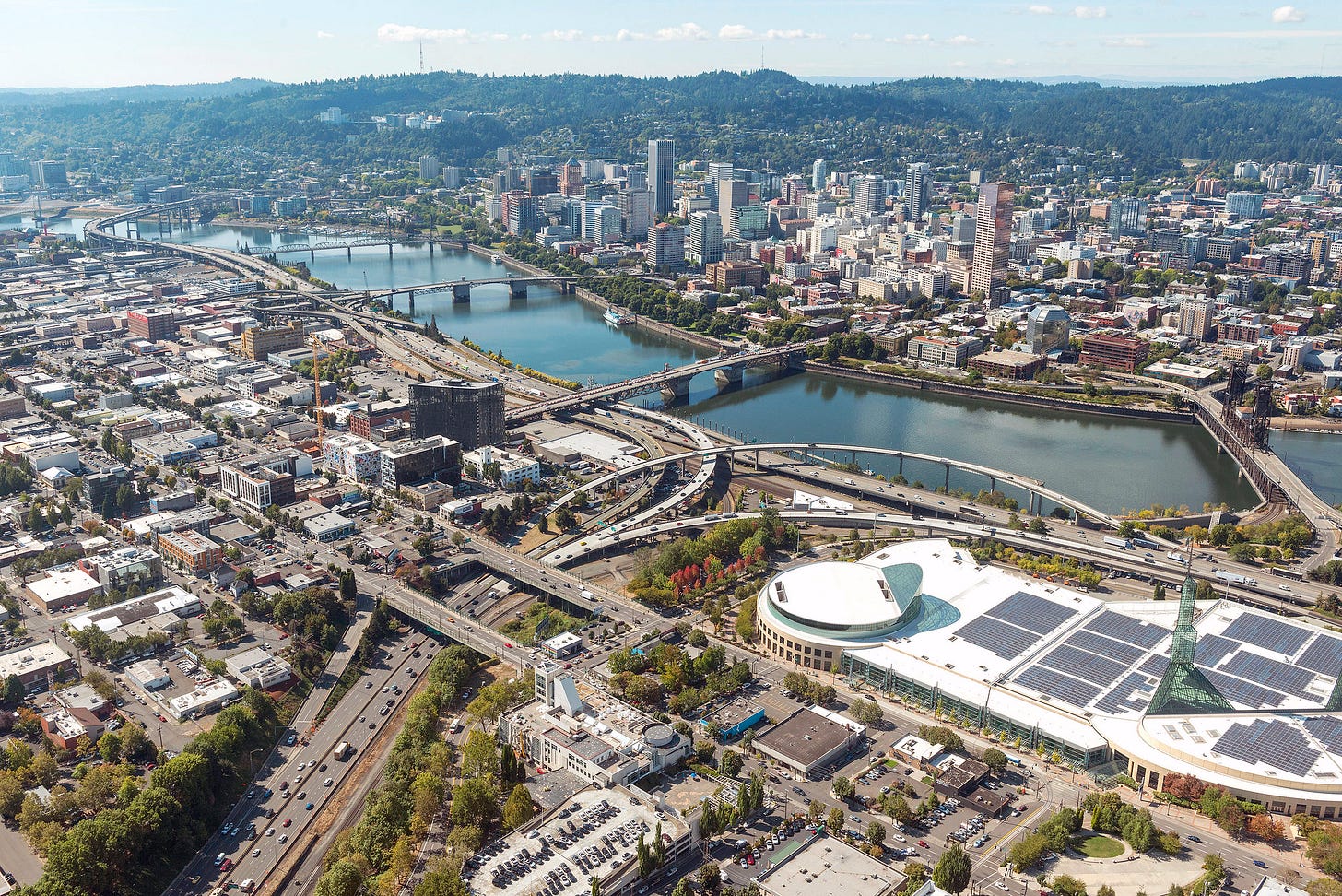This Moment and the Next One
What unpredictable encounter might hold and help clarify the moment we’re moving into?
Adam Davis works with Oregon Humanities to get people thinking and talking together, and he used to lead backcountry trail crews with the US Forest Service.
Last Monday morning as I walked from my home in Southeast Portland over the Morrison Bridge toward Oregon Humanities’ office in downtown Portland, I remembered a similar walk from just under a year ago. That May 30th 2020 walk from my home to my office took place on a Saturday rather than a Monday. Oregon was two and a half months into COVID and two nights into protests for racial justice. I was headed in early to get ready for an online meeting of our statewide board of directors. The streets were empty, the sky was gray, and the air was cool.
Just as I came off the bridge and walked into downtown, a young man appeared on my left. He had emerged quickly and silently from the street beneath the bridge, and our intersecting paths brought me closer to him than to anyone I’d encountered in public over the previous two months. I had been thinking about the upcoming board meeting — our first meeting that wouldn’t take place in person, our first in all the uncertainties of COVID, our first since Derek Chauvin killed George Floyd — and I was also absorbing how strange it was to walk into a shell of downtown that was beginning to feel combustible. The man’s clothes were loose, his walk was off-kilter, and he was holding something pressed up between his right hand and his right shoulder.
“Hey, man,” he said, “do you want a slice of pizza? Just a buck,” he said, “I’ll give it to you for a dollar.” What he was holding against his shoulder, I realized, was a square cardboard box. It was 6:45 on a Saturday morning and a man on the street, COVID notwithstanding, was trying to sell me a slice of his pizza. “No thanks,” I said from beneath my mask, “I’m good.” We were close to each other now, both of us still moving, but slowly. We were, as I remember it, eyeing each other. “How about a quarter,” he said, “I’ll give you a slice for a quarter.” “I’ve got nothing on me,” I said, “but thank you.” He shook his head and walked past me, and I shook my head and watched him go.
That moment has stayed with me and regularly rears up in my mind because it contained so much: the unexpected encounter, distance and proximity, economic difference and economic precarity, tension and suspicion, a desolate and simmering downtown, the call of my work and the sense of what that work could and could not do, and, of course, pizza. It was a moment that captured what felt to me then like the defining truths and tensions of Portland, and to some extent of the country. And it was a moment that, for me, has not yet been replaced.
But now, on the other side of the vaccine and the verdict and a different administration and multiple levels of relief, I wonder what’s next. What unpredictable encounter might hold and help clarify the moment we’re moving into? How much longer will that tense and strange early Saturday encounter hold sway as an encapsulation of Portland’s downtown, and maybe much more than that?
This is a question about markers — experiential or interpersonal markers rather than statistical markers. It is also a question about what it is that apparently isolated or random encounters might reveal — the condition of a city and its economy, the amount of tension in the air, the feel of an early morning walk over a bridge into the heart of downtown.
Six days from now, I’ll wake early on a Saturday and walk to Oregon Humanities’ office for what will be our fourth straight online board meeting. This meeting will be shorter than these meetings used to be, and less expensive, and instead of crowding 25 bodies around a table, each of us, wherever we happen to be, will crowd 25 squares on a screen.
I think this is why it’s so important to me to walk down the hill in Southeast and over the Willamette and into downtown and to sit myself down in our office, in our space, surrounded by our stuff. It’s important to me to ground myself in the place — the neighborhood, city, and state that our organization tries to cover, serve, and express. It’s important to me, too, to walk with my eyes and ears open, to see and hear the place, and to feel, as much as I can, my place in it.
I’ve realized that I’m in a state of waiting now — waiting and hoping that the next encapsulating encounter or experience will arrive soon. I likely won’t know it in the moment, but I’ll recognize it by how it stays around and keeps popping up and above all by the truth it expresses. I’m hoping for a less desperate, less tense encounter, and a kinder, warmer, exchange. I’m hoping that the place we’re in will feel different, and that whoever we are and whatever we have and don’t have in our hands and our hearts, we will feel different too.
*********************************
Keep the conversation going:
Facebook (facebook.com/oregonway)
Twitter (@the_oregon_way)




